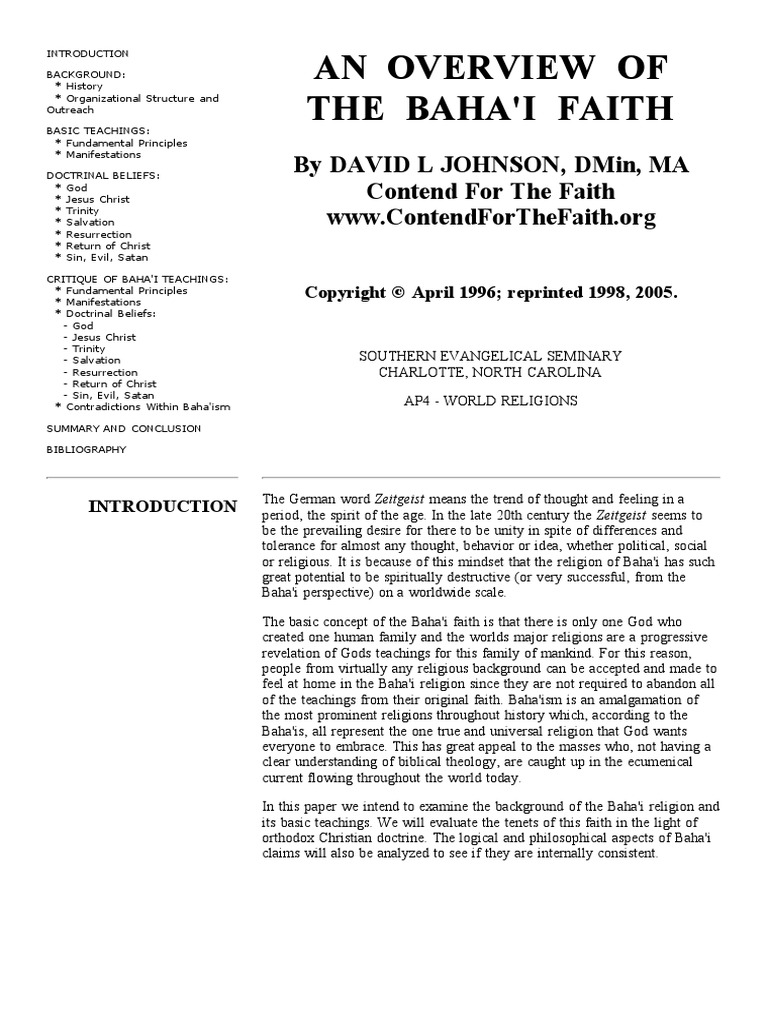The Bahá’í Faith stands as a radiant lighthouse amidst the tumultuous seas of religious conflict and disillusionment. Emerging in the mid-19th century, it encapsulates a profound synthesis of spiritual teachings, emphasizing unity, justice, and the intrinsic nobility of humankind. This succinct exploration of the Faith illuminates its core principles, illustrating the unique appeal and transformative potential it holds for individuals and societies alike.
The Oneness of Humanity
At the heart of Bahá’í teachings lies the principle of the oneness of humanity. This concept serves as a foundational tenet, positing that all people, irrespective of race, nationality, or gender, are fundamentally interconnected. Visualize a vast tapestry woven from countless threads; each thread represents a different culture or individual, yet together they create a harmonious whole. The Bahá’í Faith calls upon its followers to embrace this interconnectedness, seeking to dismantle the barriers that segregate and divide.
This principle transcends mere idealism, urging Bahá’ís to actively engage in social justice initiatives, advocate for the marginalized, and contribute to a global society characterized by equity. In an era when polarization seems to dominate discourse, the Bahá’í message resonates strongly, offering a clarion call for unity and collective action.
The Evolution of Religion
An intriguing aspect of the Bahá’í Faith is its perspective on religion as an evolving force. Bahá’ís believe that divine revelation is not static; instead, it unfolds progressively over time through the manifestations of God, including Moses, Jesus, Muhammad, and Bahá’u’lláh, the Faith’s founder. This succession can be metaphorically likened to a relay race, where each runner carries a portion of a greater truth, passing the baton to those who follow. Each manifestation graciously extends humanity’s understanding of the divine while responding to the unique needs and contexts of different eras.
The Faith promotes the idea that as society advances, so too must its religious teachings. This adaptive nature engenders a dynamic approach to spirituality, encouraging individuals to engage critically with their beliefs while remaining anchored in the moral principles that nurture the soul’s development.
Science and Religion: Twin Pillars of Truth
In an age where science and religion are often perceived as opposing forces, the Bahá’í Faith posits that they are, in fact, complementary. This dualistic framework sheds light on the belief that truth is indivisible. The Bahá’í perspective is akin to a symphonic orchestra, where each instrument plays a vital role in creating a harmonious melody. Science contributes empirical understanding and rationality, while religion provides moral guidance and a sense of purpose. Together, they foster a holistic comprehension of existence.
This integrated approach encourages followers to pursue knowledge fervently and to embrace the fruits of scientific inquiry. The Faith underscores that both scientific advancement and spiritual growth are essential for the betterment of humanity, urging individuals to cultivate both their minds and their spirits.
The Power of Service
Service emerges as another pivotal theme within Bahá’í teachings. This ethos positions acts of service not merely as charitable actions but as a pathway to spiritual fulfillment and growth. Visualize service as a river, flowing towards the ocean of human potential. Each drop of altruism contributes to the rich reservoir of collective wellbeing.
By engaging in service to others, Bahá’ís enact the principles of their Faith in tangible ways, thereby transforming communities and fostering an environment conducive to social progress. This commitment to service manifests in myriad forms, from educational initiatives to humanitarian efforts aimed at alleviating suffering. The underlying motivation remains the same: to elevate humanity, one act of kindness at a time.
Universal Education: A Catalyst for Change
Education is heralded as a fundamental right and an essential tool for individual and societal advancement within Bahá’í teachings. Describing education as a beacon of light piercing the darkness of ignorance, the Faith advocates for universal access to knowledge, transcending socioeconomic boundaries. This pursuit of enlightenment empowers individuals to realize their potential, thereby enriching their communities and contributing to global progress.
Moreover, Bahá’ís emphasize the importance of moral and spiritual education alongside academic learning, nurturing well-rounded individuals capable of contributing meaningfully to society. In this light, education is transformed from a mere accumulation of facts into a comprehensive developmental journey, fostering critical thinking, compassion, and a commitment to the betterment of humanity.
The Role of Prayer and Meditation
The practice of prayer and meditation signifies a vital aspect of Bahá’í spirituality. Often regarded as the soul’s dialogue with the divine, prayer is portrayed as a means of cultivating an intimate connection with God. Visualization plays a role here; one might think of prayer as tending to a delicate flower, nurturing it with care as it blooms and flourishes under the light of one’s faith.
Bahá’ís are encouraged to engage in regular prayer and meditation, seeking solace and guidance amid life’s challenges. This practice fosters a sense of inner peace, fortifying the spirit and shaping an individual’s character. Through these reflections, believers are reminded of their purpose and the interdependence of all creation.
Conclusion: A Vision for Future
The Bahá’í Faith offers a vision for a harmonious future, where humanity rises above its divisions to nurture a global community grounded in love, justice, and understanding. In the face of modern challenges, the teachings resonate with a timeless urgency, inviting individuals to partake in a journey toward collective enlightenment. By embracing the principles of unity, the evolution of religion, the synergy of science and religion, the power of service, the right to education, and the nurturing of one’s soul through prayer, Bahá’ís are not merely followers of a faith; they are pioneers of a transformative legacy, actively contributing to the unfolding narrative of human progress. Each individual’s commitment to embody these teachings fosters a beacon of hope, heralding the dawn of a new era in the collective journey of humanity.
